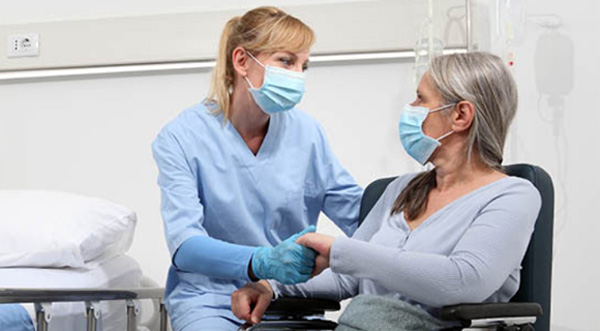HEALTH FIRST: A Patient’s Guide to Hospital Procedures, Virtual Visits During COVID-19
By Space Coast Daily // November 23, 2020
Many Americans had medical procedures postponed due to the COVID-19

BREVARD COUNTY, FLORIDA – Your surgery earlier in the year was pushed off, but now your specialist has insisted — it’s time.
Many Americans had medical procedures postponed earlier this year due to the COVID-19 pandemic, a decision supported by many health experts. But today, we have the testing, the evidence-based protocols and the practice to welcome you in safely.
Still, if you’ve scheduled a medical procedure, especially a surgery, you may be anxious about your well-being. What’s going to happen with COVID-19? Is the threat real? What protections has my hospital put in place to stop it?
“Surgeries, even minor ones, put a strain on the body’s immune and recovery systems, and a contagion such as coronavirus, dangerous under any conditions, is so very serious then,” said Dr. Jeffrey Stalnaker, Health First’s Chief Clinical Officer. “
We take every precaution to make sure our patients are protected. We ask them to consider these measures and help us to help them.”
Here’s our Health First Patient Guide for Surgery for general do’s and don’ts. What follows is a careful consideration of how COVID-19 has changed procedures and accelerated advancements.
Self-report
Stopping the pandemic begins with you. Self-report if you’re sick, even a headache. Hospitals carefully screen patients (and visitors) according to Centers for Disease Control and Prevention (CDC) guidelines upon entry and before a procedure.
Such reporting doesn’t mean your procedure won’t go forward, but it will go a long way toward keeping the hospital environment — providers, associates and fellow patients — safe.
And get ready to get tested. You may be asked to undergo more than one COVID-19 test, and you may be asked to self-quarantine for a period before your surgery. Our hospital staff gets screened before each shift and is tested regularly in addition to personal protective equipment that have become our workplace uniforms.

Ask us ─ we have answers
Don’t be shy about asking associates and your doctor about disinfection practices. Inquire as to what they do when they know a patient is sick from, or has recently tested positive for, COVID-19.
Prior to the start of any invasive procedure, we follow Joint Commission directives that all areas should be terminally cleaned, according to evidence-based protocol.
For further information, check out the CDC’s infection prevention and control recommendations for COVID-19 in healthcare settings.
Wear a mask
Studies demonstrate that positive COVID-19 infection test rates decrease after mask adoption in nearly all settings. At Health First, we adopted a universal masking policy at the beginning of April that requires anyone who enters one of our facilities to wear a cloth face mask.
“This policy gives our associates and patients an added layer of protection not only from COVID-19 but any airborne illness,” Dr. Stalnaker said at the time.
Also, patients must be prepared to follow prescribed routes around hospital hallways. Our administrators have enacted a number of practices aimed at physically spacing patients and guests, an active strategy in the fight against COVID-19.
Virtual Visits
A century ago, doctors made house calls. Today, many are again, in a whole new way. The CDC advises optimizing telehealth services wherever possible. (The federal government has made telehealth services easier to implement and access.)
One of the first efforts made at Health First was to invest in and expand our Virtual Visits. Our healthcare network is committed to patient health, wherever those patients might be. We offer world-class, face-to-face care without any potential of exposure to COVID-19 or the spread of it.
It’s an innovation that will last.
“When this is over, many of the innovative precautions we’ve adopted in 2020 will stick around – and the innovative ways families have kept their loved ones connected, and stayed connected with each other, will stick around too,” Dr. Stalnaker said.
At Health First we’ve adopted aHIPAA-compliant phone app that allows clinicians and staff in the ER, surgery, ICU and other units to send patient updates to family through texts, pictures and videos to keep them apprised of their loved ones’ condition. (And a fun fact — it’s “Gator”-led, according to the University of Florida.)
Visitation
Before your procedure, even an outpatient one, be sure you know exactly what the visitation policies are. At Health First, as it is across the nation, we are limiting visitors in select units to prevent the spread of the virus.
If your procedure calls for spending a few days with us while you recover, are you aware of the visitation rules? Are you set up to video conference with your loved ones? Patients should arrive ready to stay connected through a smartphone or tablet device.
All of Health First’s facilities have guest Wi-Fi. Video chatting, VoIP (Voice over Internet Protocol calling) and text communication are all ways the internet has brought family and friends into our lives in the hospital. Games and streaming channels are a reliable way to unwind while visiting.
To find out more about what you should expect before, during and after your medical procedure at a Health First facility, review our comprehensive Patient Guide for Surgery, and contact your doctor or staff about any COVID-19 concerns.














